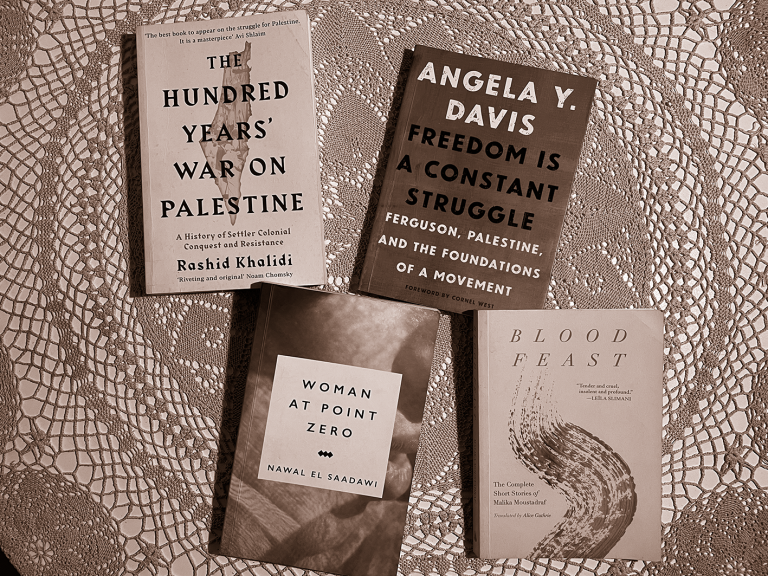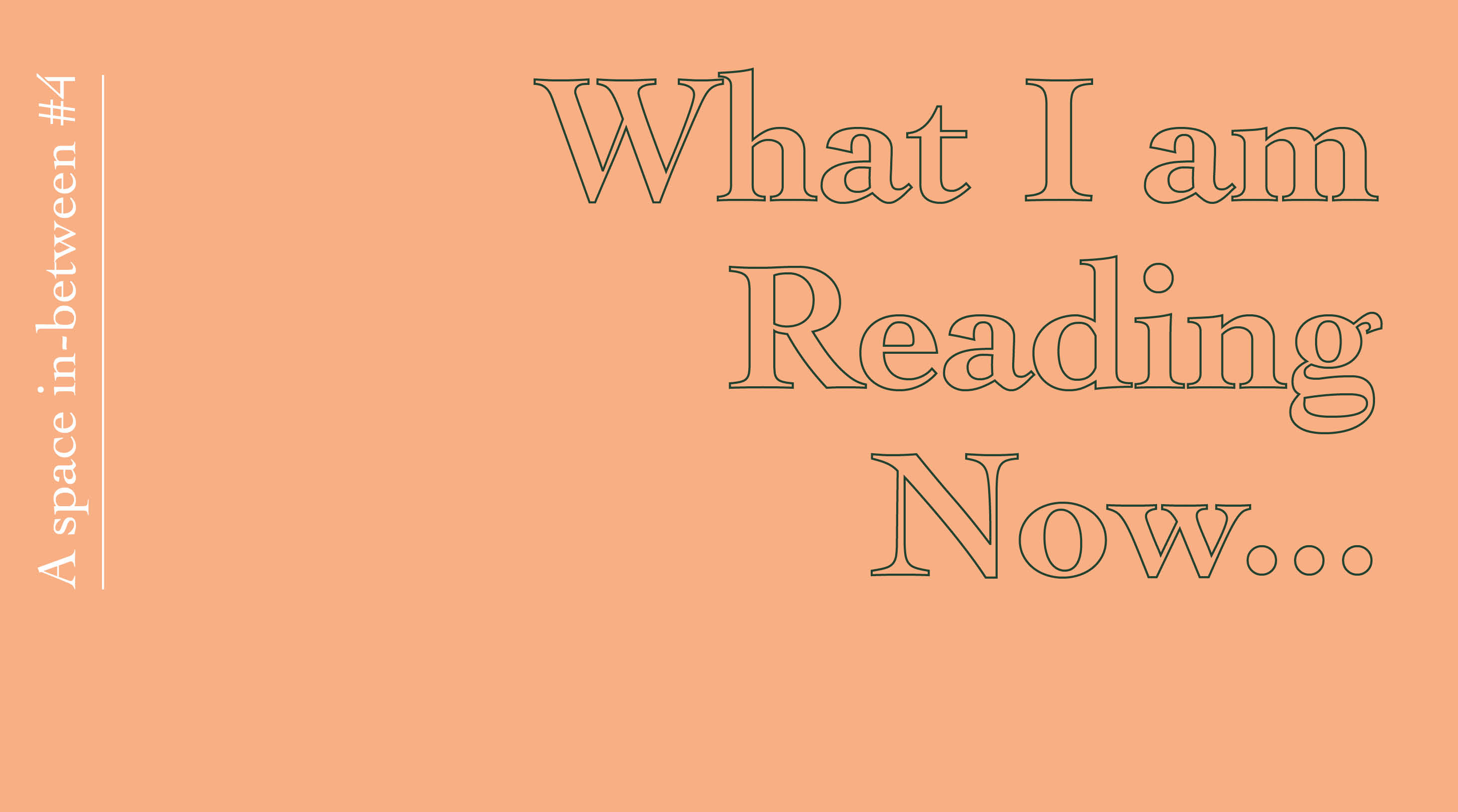What I am Reading Now…
Dayna Ash
February 2024
Although it may seem cliché to say, I’ve always found solace and escape in the vastness found between the lines of a paperback book. From youth and into adulthood, the world seemed bleak and unwelcoming unless formed and sculpted by metaphors and analogies. Maybe that’s why I only was able to taste liberation when I wrote poems, both short and long, they embodied pieces of myself that I had been too fearful to face or contain. No matter the end result of whichever project I was working on, whether it was to be a film, an album or an improvised performance, it always began as a poem. Writing to me always stroked the flames of revolution, it intensified senses and compassion, it encapsulated the longing and desire of a people, of a world, mired by the cost of greed and power.
I haven’t read poetry books in a long time but the books I have read have helped and guided me into writing my own poems. Fuelled and emboldened by my region’s writers, I grew more aware, enraged and hungry. An intersectional feminist that could no longer abide with what the world had perceived of both our plight and existence.
Now my poems are an ode to queerness, the political, to the savage and dangerous thinkers, and writers that did not fear the consequences as they embraced truth.
Authors like Angela Davis shake imperialists in their home stead. Her book Freedom is a Constant Struggle, Ferguson, Palestine, and the Foundations of a Movement emphasises to both activists and idle participants the implications of systemic racism and police/militarised states, as being intrinsically rooted in the evil of the industrial military and prison complex. She etched and described the necessity and manner needed for transnational solidarity. A sentence in that particular book is one I constantly quote, I used it often during the Lebanese revolution of 2019 and throughout discussions and actions for the liberation of Palestine. “We are not a leaderless movement; we are a leaderful movement”.
When I read Nawal El Saadawi, something in me shifted, as if I could understand many feelings and the conditions that had lingered in the shadows, never fully taking solid shape. She made a voice, tangible, giving it echo. I read her memoir titled, Memoirs of a Woman Doctor before her novels. It had been a gift from someone who worked with me and had quickly become family. It was truly a gift, both the book itself and that fact that it was my introduction to Nawal and I soon read many of her novels. One of my favourite books is Woman at Point Zero. In the book Nawal sets the scene to meeting Firdaus in a series of prison interviews before her execution. We learn about Firdaus and about the strength mustered when enduring the cruelty of living within a patriarchal regime and world. Nawal, or in this instance, Firdaus gave us the most iconic line, to both live and die by: “I am speaking the truth. And truth, is savage and dangerous.”
My partner gave me another blessing in the form of a book, titled Blood Feast: The Complete Short Stories of Malika Moustadraf. I discovered the Moroccan writer, Malika well after her death from kidney failure. She gave us a few short stories that have carved a very visible space in the literary Arab feminist field. I read her collection, in one night, thinking that I would read one chapter and nod off to sleep. This was a huge miscalculation on my part, as I stayed awake till the sun came up and I reached the final page.
Now I’ve just started reading The Hundred Years’ War on Palestine: A History of Settler Colonialism and Resistance by Rashid Khalidi. Poetry is my first love but history is a close second. This book is a vivid account of history and experience from those bearing the blunt burden of dispossession and oppression. I recommend this book to anyone who is unaware or uninformed about the reality of settler colonialism in Palestine.
It would be amiss of me to not mention one of the most intriguing writers I’ve encountered. Another Moroccan writer, sociologist and one of the founders of Islamic feminism is Fatema Mernissi. She gives a counter argument to the exclusion of women from Islam by studying holy texts, she says “Since all power, from the seventh century on, was only legitimated by religion, political forces and economic interests pushed for the fabrication of false traditions.”
Dayna Ash (she/they) is an intersectional feminist, performing artist, published writer, playwright, and the founder & Executive Director of Haven for Artists; a cultural feminist organisation working at the intersection of art and activism. Dayna is an auto-dictate academic whose work in advocacy and arts is rooted in intersectional and de-colonial queer practices for the creation of alternative structures and a community-based approach to fighting injustice and oppression.
She is the Intersectional Feminism Advocacy Fellow at The Asfari Institute for Civil Society and Citizenship at the American University of Beirut, an Arts for Gender Fellow for Care USA and The Rockefeller Foundation. She was named one of the BBC’s 100 Most Inspirational Women in 2019, awarded the Woman of Distinction award in 2020 by the NGO Committee on the Status of Women, and Leader in LGBT Health Equity award from the Lebanese Medical Association for Sexual Health in 2021 for advancing LGBTQ wellbeing in Lebanon.
Reading
Freedom Is A Constant Struggle: Ferguson, Palestine and the foundations of a movement, Angela Y. Davis (Haymarket, 2016)
Memoirs of a Woman Doctor, Nawal El Saadawi (City Lights Publishers, 2001. Originally published 1958)
Woman at Point Zero, Nawal El Saadawi (Bloomsbury, 2020. Originally published 1977)
Blood Feast: The Complete Short Stories of Malika Moustadraf, Trans. Alice Guthrie (The Feminist Press at CUNY, 2022)
The Hundred Years’ War on Palestine: A History of Settler Colonial Conquest and Resistance, Rashid Khalidi (Profile Books, 2020)
The Veil And The Male Elite: A Feminist Interpretation Of Women’s Rights In Islam, Fatema Mernissi (Basic Books, 1991)

Please note the views published in What I am Reading Now… are personal reflections of the contributors.
These may not necessarily represent the views of the University of Dundee.
Readers who wish to make a donation to support Medical Aid for Palestinians can do so here.
———
Previous Issue: Hamja Ahsan, January 2024
Next Issue: Nhã Thuyên, March 2024
